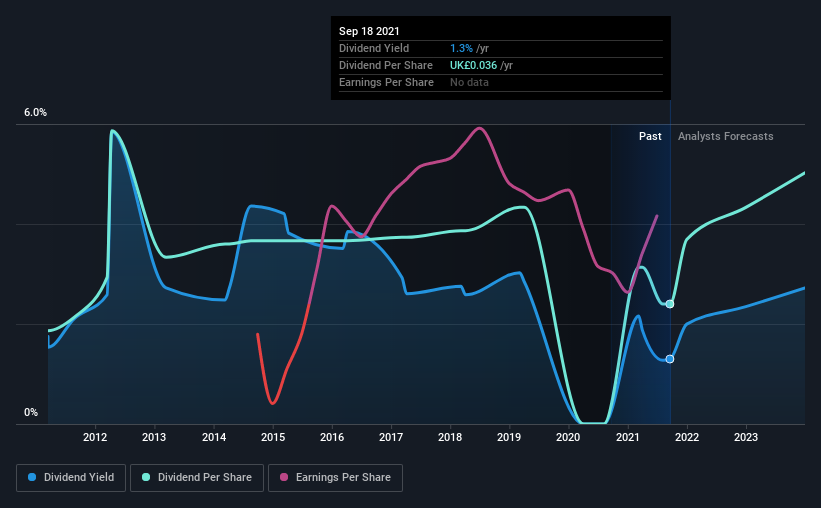Don't Race Out To Buy TT Electronics plc (LON:TTG) Just Because It's Going Ex-Dividend
Regular readers will know that we love our dividends at Simply Wall St, which is why it's exciting to see TT Electronics plc (LON:TTG) is about to trade ex-dividend in the next 3 days. The ex-dividend date is one business day before the record date, which is the cut-off date for shareholders to be present on the company's books to be eligible for a dividend payment. The ex-dividend date is important because any transaction on a stock needs to have been settled before the record date in order to be eligible for a dividend. Therefore, if you purchase TT Electronics' shares on or after the 23rd of September, you won't be eligible to receive the dividend, when it is paid on the 14th of October.
The company's next dividend payment will be UK£0.018 per share, and in the last 12 months, the company paid a total of UK£0.036 per share. Last year's total dividend payments show that TT Electronics has a trailing yield of 1.3% on the current share price of £2.77. Dividends are a major contributor to investment returns for long term holders, but only if the dividend continues to be paid. As a result, readers should always check whether TT Electronics has been able to grow its dividends, or if the dividend might be cut.
Check out our latest analysis for TT Electronics
Dividends are typically paid from company earnings. If a company pays more in dividends than it earned in profit, then the dividend could be unsustainable. TT Electronics paid out 111% of profit in the past year, which we think is typically not sustainable unless there are mitigating characteristics such as unusually strong cash flow or a large cash balance. Yet cash flow is typically more important than profit for assessing dividend sustainability, so we should always check if the company generated enough cash to afford its dividend. TT Electronics paid out more free cash flow than it generated - 191%, to be precise - last year, which we think is concerningly high. It's hard to consistently pay out more cash than you generate without either borrowing or using company cash, so we'd wonder how the company justifies this payout level.
As TT Electronics's dividend was not well covered by either earnings or cash flow, we would be concerned that this dividend could be at risk over the long term.
Click here to see the company's payout ratio, plus analyst estimates of its future dividends.
Have Earnings And Dividends Been Growing?
Businesses with shrinking earnings are tricky from a dividend perspective. If earnings fall far enough, the company could be forced to cut its dividend. So we're not too excited that TT Electronics's earnings are down 2.1% a year over the past five years.
Many investors will assess a company's dividend performance by evaluating how much the dividend payments have changed over time. TT Electronics has delivered 2.5% dividend growth per year on average over the past 10 years. That's intriguing, but the combination of growing dividends despite declining earnings can typically only be achieved by paying out a larger percentage of profits. TT Electronics is already paying out 111% of its profits, and with shrinking earnings we think it's unlikely that this dividend will grow quickly in the future.
To Sum It Up
From a dividend perspective, should investors buy or avoid TT Electronics? It's looking like an unattractive opportunity, with its earnings per share declining, while, paying out an uncomfortably high percentage of both its profits (111%) and cash flow as dividends. Unless there are grounds to believe a turnaround is imminent, this is one of the least attractive dividend stocks under this analysis. With the way things are shaping up from a dividend perspective, we'd be inclined to steer clear of TT Electronics.
So if you're still interested in TT Electronics despite it's poor dividend qualities, you should be well informed on some of the risks facing this stock. Be aware that TT Electronics is showing 2 warning signs in our investment analysis, and 1 of those doesn't sit too well with us...
We wouldn't recommend just buying the first dividend stock you see, though. Here's a list of interesting dividend stocks with a greater than 2% yield and an upcoming dividend.
This article by Simply Wall St is general in nature. We provide commentary based on historical data and analyst forecasts only using an unbiased methodology and our articles are not intended to be financial advice. It does not constitute a recommendation to buy or sell any stock, and does not take account of your objectives, or your financial situation. We aim to bring you long-term focused analysis driven by fundamental data. Note that our analysis may not factor in the latest price-sensitive company announcements or qualitative material. Simply Wall St has no position in any stocks mentioned.
Have feedback on this article? Concerned about the content? Get in touch with us directly. Alternatively, email editorial-team (at) simplywallst.com.

 Yahoo Finance
Yahoo Finance 
